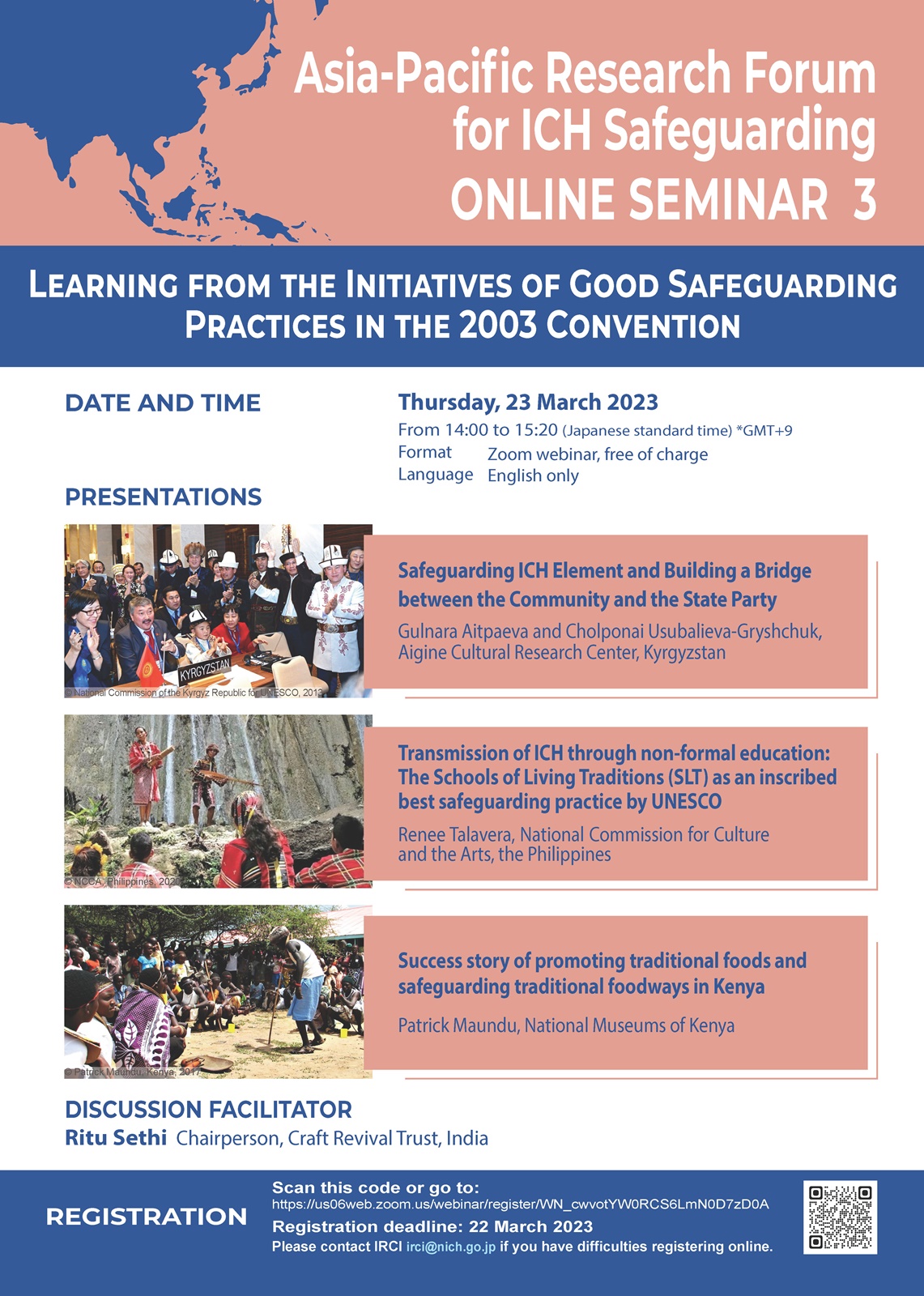EVENTS
07/03/2023
The third online seminar for safeguarding ICH in the Asia-Pacific region will be held on 23 March 2023
The online seminars for safeguarding ICH in the Asia-Pacific region launched in December 2022 aim to address various issues and latest trends in ICH research in the Asia-Pacific region. Its third seminar will be held on 23 March 2023. Inviting presenters who are involved in good safeguarding practices in Kyrgyzstan, the Philippines and Kenya, this seminar will discuss issues related to the transmission of ICH, as well as various safeguarding measures.
Online Seminar 3
Learning from the Initiatives of Good Safeguarding Practices in the 2003 Convention
Date and time:
Thursday, 23 March 2023 14:00–15:20 (JST)*GMT+9
Zoom Webinar (Registration is required. Please see below for registration.)
Language: English
Presentations
Safeguarding ICH Element and Building a Bridge between the Community and the State Party
Gulnara Aitpaeva and Cholponai Usubalieva-Gryshchuk, Aigine Cultural Research Center (CRC), Kyrgyzstan
Transmission of Intangible Cultural Heritage (ICH) through non-formal education: The Schools of Living Traditions (SLT) as an inscribed best safeguarding practice by the United Nations Educational, Scientific and Cultural Organization (UNESCO)
Renee Talavera, National Commission for Culture and the Arts, the Philippines
Success story of promoting traditional foods and safeguarding traditional foodways in Kenya
Patrick Maundu, National Museums of Kenya
Discussion Facilitator
Ritu Sethi, Craft Revival Trust, India
For the introduction of safeguarding practices that presentations will cover and the profiles of presenters and facilitator, please see below.
Registration:
Registration (free of charge) is required for participating in the seminar.
This seminar is open to the public, and anyone interested in the topic is welcome to join. Please register from:
https://us06web.zoom.us/webinar/register/WN_cwvotYW0RCS6LmN0D7zD0A
*Registration deadline: 22 March 2023
Please contact IRCI if you have difficulties registering online.
*The Forum has been established under IRCI’s research project, ‘Creation of the Asia-Pacific Regional Hub of Research for the Safeguarding of ICH’.
Contact:
IRCI Secretariat
TEL:+81-72-275-8050
FAX:+81-72-275-8151
E-mail: irci@nich.go.jp
Introduction of Good Safeguarding Practices
Safeguarding the epic heritage, namely Manas.Semetey.Seytek trilogy(Kyrgyzstan)
The presentation will cover the entire process of safeguarding the epic trilogy Manas.Semetei.Seytek from the very first initiative of the Aigine CRC in building a network of epic chanters—manaschy, launching a school for novice bards, and working with them to prepare and produce the first digital version of the contemporary epic recitation. The presentation will focus on the results of this collaboration in inscription of the element into the RL and all further activities and initiatives that have been evolving around the epic heritage. The main focus of the presentation is on conveying a successful model of collaboration between the NGO sector, community and the state party and the results it can lead to. The presentation will also cover unexpected consequences from the process of safeguarding the epic heritage—politicization of the ICH, i.e. using the epic for political purposes.
The Schools of Living Traditions (The Philippines)
The Schools of Living Traditions (SLT) are community-based non-formal centers of learning wherein cultural masters transmit their traditional knowledge and skills to selected students within the same community. This was conceptualized and initiated in 1995 to integrate traditional culture and its various creative expressions into the national cultural mainstream through the transfer of indigenous, folk, and traditional practices, skills, crafts, and knowledge by recognized cultural masters in the community to the younger generations of a community. To ensure the sustainability of the program, a five-year enhanced scheme was developed in 2015 that consists of traditional knowledge and skills transfer during the first three years, including product development and marketing during the fourth and fifth year, respectively. To date, a total of 29 SLTs are being implemented in various locations in the country. On December 16, 2021, the SLT was recognized as a programme, project, or activity that “best reflects the principles and objectives of the Convention” and was therefore inscribed in the UNESCO Register of Good Safeguarding Practices.
Success story of promoting traditional foods and safeguarding traditional foodways in Kenya
In Kenya, traditional foodways were under threat due to historical factors and the pressure of modern lifestyles. Understanding that a decline in food diversity and knowledge would have serious ramifications on health and on food and nutrition insecurity, in 2007 Kenya committed to safeguarding related practices and expressions. The first initiative involved inventorying traditional foods, with a focus on traditional vegetables. About 850 indigenous plants with local names were recorded, followed by detailed documentation of use and related indigenous knowledge and practices. For the second initiative, UNESCO in partnership with the Department of Culture and the International and National Museums of Kenya, and in consultation with community leaders, initiated a pilot project to identify and inventory traditional foodways in partnership with primary school children to raise awareness about the threat to traditional foodways. Both initiatives have since led to other related activities carried out independently by local institutions and among other communities in Kenya, Ethiopia and Burkina Faso.
Profiles
Presenters
Gulnara Aitpaeva, Director, Aigine Cultural Research Center (CRC), Kyrgyzstan
Gulnara Aitpaeva, Doctor in Philology, is currently the director of Aigine CRC with the mission of expanding research on lesser-known aspects of the intangible cultural and natural heritage of Kyrgyzstan, integrating folk and scholar epistemologies. In 2012–2016, she was a country representative in the Intergovernmental Committee for the Safeguarding of ICH of UNESCO, and served as an expert in the Subsidiary Body of Intergovernmental Committee on ICH for 2013–2015.
Cholponai Usubalieva-Gryshchuk, Project Coordinator, Aigine CRC
Cholponai U-G, graduate of the American University in Central Asia, is with research interest in the epic trilogy and Kyrgyz indigenous worldview.
Renee Talavera
Head, Cultural Communities and Traditional Arts Section, National Commission for Culture and the Arts (NCCA), the Philippines
Renee Talavera is a specialist in anthropology and sociology of education, and an advocate of numerous ICH safeguarding programmes in the country, as reflected in her life and work. Some of the most notable programmes she currently manages are the SLT and ICH programmes, which respond to NCCA’s mandate of cultural safeguarding.
Patrick Maundu
Ethnobotanist, National Museums of Kenya
Patrick Maundu is an ethnobotanist who has devoted much of his life to researching the indigenous knowledge of African biodiversity, especially in health and nutrition. Maundu led a multi-institutional team of researchers in promoting African leafy vegetables and dietary diversification (2001–2010) in 10 African countries. He also coordinated the proposal of the Kenyan traditional foodway initiative.
Discussion Facilitator
Ritu Sethi
Chairperson, Craft Revival Trust, India
- ARCHIVE
- CATEGORY
- Research Data Collection
- Creation of Research Forum
- SDGs
- Climate change
- Natural hazards
- COVID-19 Pandemic
- Endangered ICH
- Post-conflict
- Legal systems
- Documentation
- Conferences/Meetings
- Seminars
- Symposiums/Forums
- Workshop/Working sessions
- Field research
- Information
- Visits
- Publications
- YouTube
- C2Centre
- UNESCO
- Cooperation-with-Sakai-city
- Governing Board Meetings
- Others




